
Social media analytics software provides businesses with the ability to track, monitor, and analyze their social media presence, including engagement, reach, and audience demographics. With so many options available, it can be overwhelming to choose the best social media analytics software.
Whether you’re a small business owner or part of a large marketing team, having access to accurate and detailed analytics can make a significant impact on your social media strategy. By utilizing the best social media analytics software, you can gain valuable insights into your audience, track your progress, and adjust your marketing efforts accordingly.
1. SocialBee
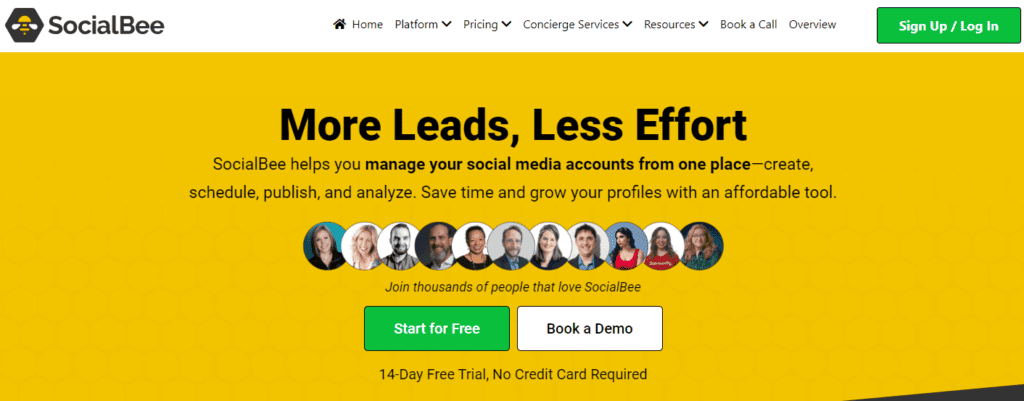
SocialBee is an all-in-one social media management tool that offers a variety of features to help businesses manage their social media accounts more efficiently. Here are some of the pros and cons of using SocialBee for social media analytics.
Pros
- Multiple Platform Support: SocialBee supports multiple social media platforms, including Facebook, Twitter, Instagram, LinkedIn, Pinterest, Google Profile, TikTok, and YouTube. This makes it easier for businesses to manage all of their social media accounts from one place.
- Automation: SocialBee allows users to automate their social media posting, which saves time and effort. Users can schedule their posts in advance, so they don’t have to worry about manually posting content every day.
- Insightful Data: SocialBee provides insightful data about social media growth, which can help businesses make informed decisions about their social media strategy. Users can track their performance over time and identify areas for improvement.
- Content Customization: SocialBee offers a variety of content customization options, including content categories and content folders. This allows businesses to organize their posts by topic and schedule them alternatively to surprise their followers with fresh posts.
Cons
- Pricing: SocialBee can be expensive for small businesses or individuals who are just starting out. The pricing plans are based on the number of social media accounts and features, so businesses may end up paying for features they don’t need.
- Learning Curve: SocialBee can take some time to learn, especially for users who are new to social media management tools. However, the company offers training and support to help users get up to speed.
In summary, SocialBee is a comprehensive social media management tool that offers a variety of features to help businesses manage their social media accounts more efficiently.
2. Social Status

Social Status is a powerful suite of social media analytics tools that automates social media reporting for marketers and advertisers. It supports various social media platforms, including Facebook, Instagram, Instagram Stories, TikTok, Twitter, YouTube, and LinkedIn.
Pros
- Customizable templates: Social Status offers customizable report templates that can be tailored to meet specific business needs. This feature saves time and effort, making it easier to generate reports quickly and efficiently.
- Automated reporting: Social Status automates social media reporting, saving marketers countless hours of manual work. This feature allows marketers to focus on other important tasks while Social Status generates reports in the background.
- Full funnel insights: Social Status provides full funnel insights and metric performance for connected social media profiles. This feature helps marketers to understand how their social media efforts are impacting their business goals.
Cons
- Limited integrations: Social Status offers limited integrations with other marketing tools. This feature may be a drawback for marketers who rely on multiple tools to manage their marketing campaigns.
- Limited social media listening features: Social Status does not offer advanced social media listening features. This feature may be a drawback for marketers who want to monitor social media conversations and track brand mentions in real-time.
Overall, Social Status is a powerful social media analytics tool that automates social media reporting and provides full funnel insights for connected social media profiles.
3. Pallyy

Pallyy is a social media management and analytics tool that offers a range of features to help businesses grow their social media presence. Here are the pros and cons of using Pallyy:
Pros
- Affordable pricing: Pallyy offers feature-rich social media management and scheduling at an affordable price. This makes it a great option for small businesses and startups that are looking for a cost-effective solution.
- Customizable reports: Pallyy’s report builder allows you to create custom analytics reports that can be shared and exported. This is a great feature for agencies that need to send reports directly to their clients.
- Easy scheduling: Pallyy makes it easy to schedule posts in advance to social media networks like Instagram, Facebook, and Twitter. This is a great feature for businesses that want to save time and streamline their social media management.
- Competitor analysis: Pallyy allows you to compare your social media performance with that of your competitors. This is a great feature for businesses that want to stay ahead of the competition.
Cons
- Limited social media networks: Pallyy currently only supports Instagram, Facebook, and Twitter. This means that businesses that use other social media networks may need to use additional tools to manage their social media presence.
- Limited integrations: Pallyy currently has limited integrations with other tools and platforms. This means that businesses that use other tools may need to manually transfer data between platforms.
Overall, Pallyy is a great option for businesses that are looking for an affordable and feature-rich social media management tool. However, businesses that use other social media networks or need advanced analytics and reporting may need to use additional tools.
4. Sendible
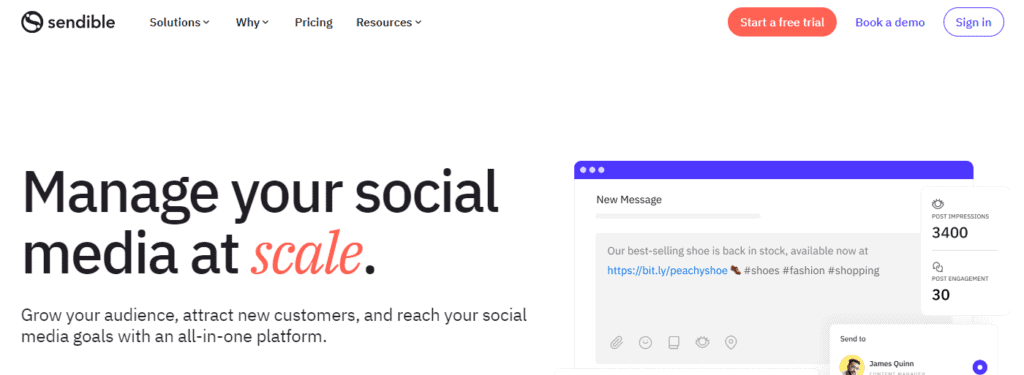
We found Sendible to be a comprehensive social media management tool that offers a wide range of features. Here are some of the pros and cons of using Sendible:
Pros
- Efficient social media management: Sendible streamlines social media management by enabling easy cross-platform posting, effortless post reviewing and approval process, and automatic scheduling of approved posts, freeing up time and simplifying workflows.
- User-friendly design: The platform’s seamless integration with the iPhone app, combined with its attractive and user-friendly design, enhances the user experience and increases satisfaction.
- Advanced analytics: Sendible provides in-depth analytics and reporting features, including audience insights, engagement metrics, and more. The platform also offers customizable reports that can be generated automatically and sent to clients.
- Collaboration tools: Sendible offers collaboration tools that allow team members to work together seamlessly. Users can assign tasks, track progress, and communicate with each other within the platform.
Cons
- Limited integrations: While Sendible integrates with a variety of social media platforms, it has limited integrations with other tools, which may be a drawback for some users.
- Steep learning curve: Sendible’s extensive feature set can make it challenging for new users to get started. However, the platform offers a variety of resources to help users get up to speed, including video tutorials and a knowledge base.
Overall, we found Sendible to be a powerful social media management tool that offers a wide range of features and customization options. While it may not be the best fit for every business, it’s definitely worth considering if you’re looking for a comprehensive solution to manage your social media presence.
5. Brand24
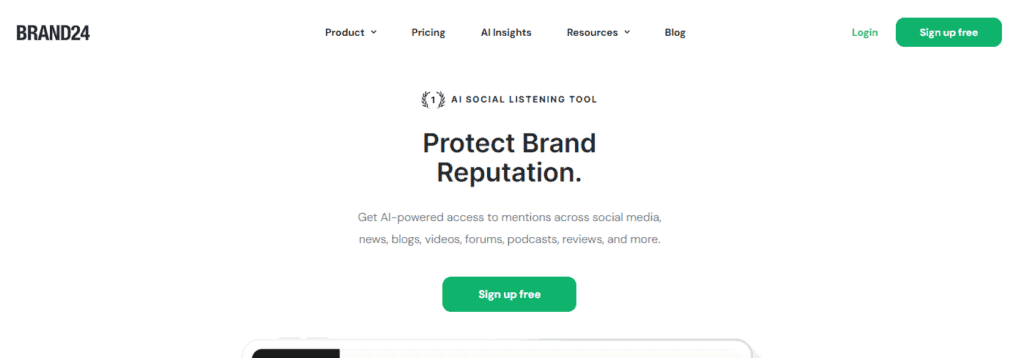
Brand24 is a social media analytics tool that helps measure the buzz around your brand, product, business, or keyword. It is a great tool for small and medium-sized brands that want to track their social media presence and monitor their competitors.
Pros
- Easy-to-use platform: Brand24 has a user-friendly interface that makes it easy to navigate and use the platform. You can set up your account in minutes and start tracking your social media presence right away.
- Real-time monitoring: Brand24 provides real-time monitoring of your social media channels, so you can stay on top of any mentions, comments, or reviews about your brand.
- Coordinated follow-up process: Brand24 makes it easy to follow up on mentions and comments by providing a coordinated follow-up process. You can reply to comments and messages directly from the platform and keep track of your interactions with your audience.
- Simple organization on the platform: Brand24 organizes your social media mentions and comments into easy-to-read categories, such as positive, negative, and neutral. This makes it easy to see how your brand is performing on social media and identify areas for improvement.
- Mobile app: Brand24 has a mobile app that allows you to monitor your social media channels on-the-go. You can receive notifications about new mentions and comments, and reply to them directly from your phone.
Cons
- Limited social media channels: Brand24 only supports a limited number of social media channels, including Twitter, Facebook, Instagram, and YouTube. If you use other social media channels, you will need to use a different tool to track them.
- Limited features: Brand24 does not offer as many features as some of its competitors, such as social media scheduling and publishing. If you need these features, you will need to use a different tool or platform.
Overall, Brand24 is a great tool for small and medium-sized brands that want to track their social media presence and monitor their competitors. It is easy to use, provides real-time monitoring, and has a coordinated follow-up process.
6. Iconosquare
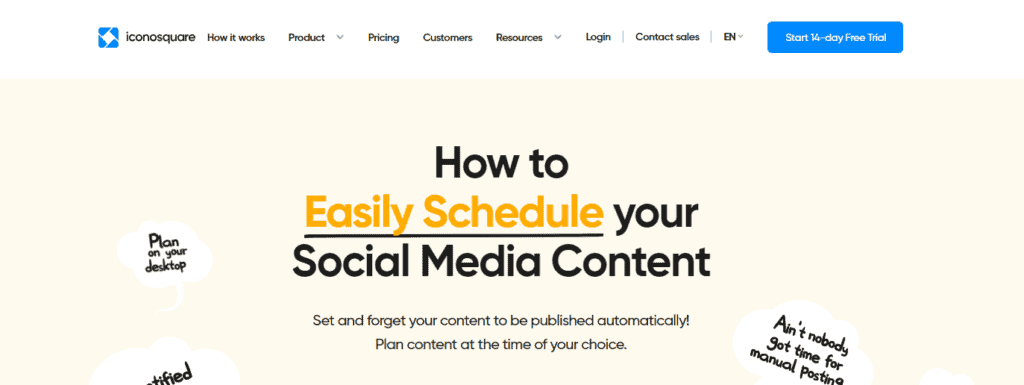
Iconosquare is a social media analytics and management tool that was founded in 2011. It is designed to help brands and agencies track their social media performance and make data-driven decisions.
Pros
- Comprehensive analytics: Iconosquare provides in-depth analytics for Instagram, TikTok, LinkedIn, Twitter, and Facebook. You can track your follower growth, engagement rate, reach, impressions, and more. The platform also offers insights into your audience demographics and behavior.
- Competitive analysis: With Iconosquare, you can compare your performance to that of your competitors. This feature allows you to identify areas where you need to improve and learn from your competitors’ successes.
- Content scheduling: Iconosquare allows you to schedule your social media posts in advance. This feature saves time and ensures that your content is published at the optimal time for your audience.
- Customizable dashboards: You can create custom dashboards that display the metrics that matter most to you. This feature makes it easy to monitor your social media performance at a glance.
- Affordable pricing: Iconosquare offers affordable pricing plans that are suitable for businesses of all sizes. The plans start at $29 per month, and you can try the platform for free for 14 days.
Cons
- Limited integrations: Iconosquare does not integrate with as many third-party tools as some of its competitors. This limitation may be a drawback for businesses that rely heavily on other software.
- Steep learning curve: Iconosquare has a lot of features, and it can take some time to learn how to use them all effectively. The platform does offer tutorials and support, but some users may find the learning curve to be steep.
Overall, Iconosquare is a powerful social media analytics and management tool that is suitable for businesses of all sizes. Its comprehensive analytics, competitive analysis, and content scheduling features make it a valuable asset for any social media marketer.
7. Metricool
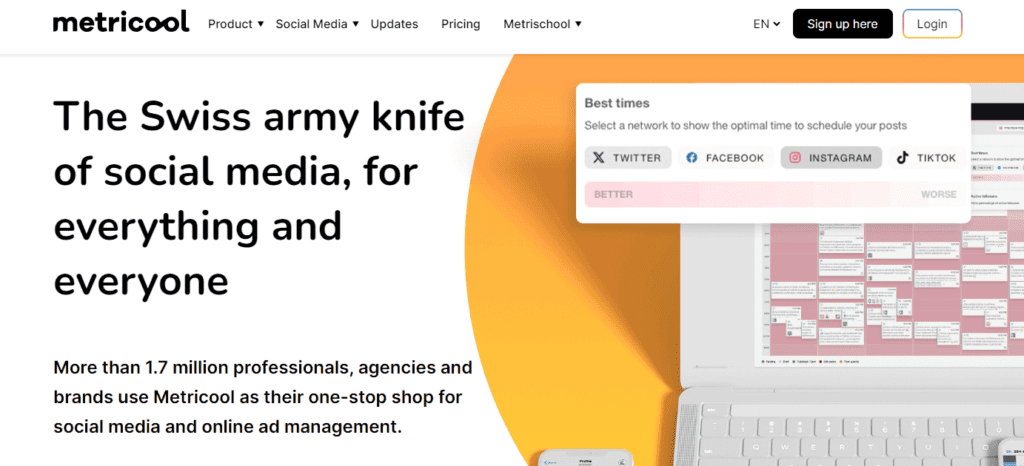
Metricool is a social media analytics and management tool that offers a variety of features to help businesses and individuals optimize their social media presence.
Pros
- Comprehensive analytics: Metricool offers a wide range of analytics tools for various social media platforms, including Instagram, Twitter, Facebook, LinkedIn, and YouTube. Users can track metrics such as engagement, reach, and follower growth to gain insights into their audience and content performance.
- Scheduling and publishing: Metricool allows users to schedule and publish posts across multiple social media platforms, making it easy to manage content and maintain a consistent posting schedule.
- Customizable reports: Metricool offers customizable reports that allow users to track and analyze their social media performance over time. Reports can be customized to include specific metrics and time frames, and can be exported in various formats.
- User-friendly interface: Metricool’s interface is intuitive and easy to use, with clear navigation and helpful tooltips to guide users through the various features.
Cons
- Limited free plan: While Metricool offers a free plan, it is quite limited in terms of features and analytics. Users will need to upgrade to a paid plan to access more advanced features.
- Limited integrations: Metricool currently only integrates with a few third-party tools, including Google Analytics and Slack. Users may need to manually transfer data between Metricool and other tools they use.
Overall, Metricool is a powerful social media analytics and management tool that can help businesses and individuals optimize their social media presence. While the tool’s pricing may be a deterrent for some users, its comprehensive feature set and user-friendly interface make it a strong contender in the social media analytics market.
Conclusion
In conclusion, choosing the right social media analytics software is crucial for businesses to grow their online presence and reach their target audience. Based on our research, we have identified some of the best social media analytics software available. These include SocialBee, Social Status and Pallyy.
Each of these tools has its own unique features and capabilities, and businesses should choose the one that best fits their specific needs and goals.
Ultimately, the key is to choose a social media analytics software that provides accurate and relevant data, is easy to use, and integrates well with other tools and platforms. By doing so, businesses can gain a competitive edge in the ever-evolving world of social media marketing.
Frequently Asked Questions
Social media analytics can provide insights into various metrics such as engagement rate, reach, impressions, clicks, and conversions. These metrics can help you understand your audience, measure the impact of your content, and optimize your social media strategy.
When looking for a social media analytics dashboard, it’s important to consider your business needs and goals. Some key features to look for include real-time tracking and analysis, customizable reports, integration with other tools, and ease of use.
While Google Analytics is not solely a social media analytics tool, it can be a valuable tool for tracking social media metrics. You can use Google Analytics to track social media campaigns, measure social ROI, and analyze user behavior on your website.
